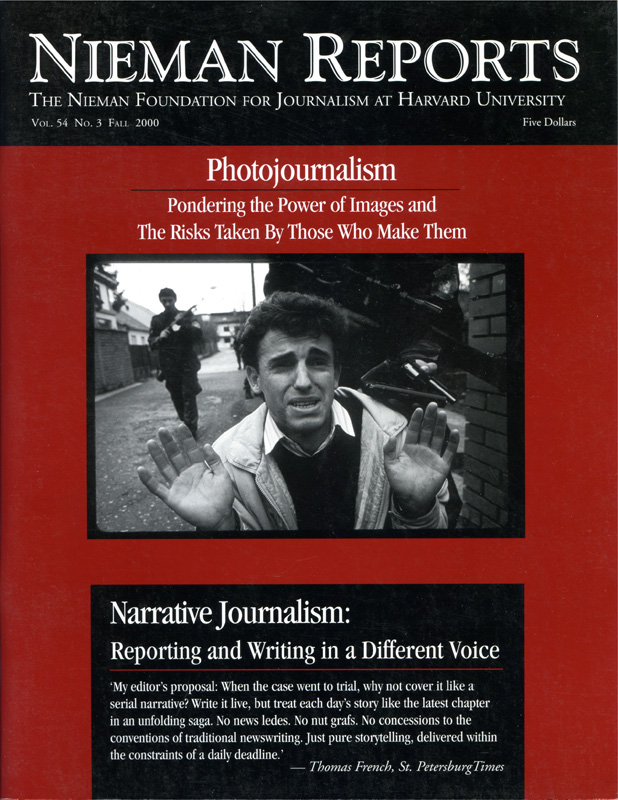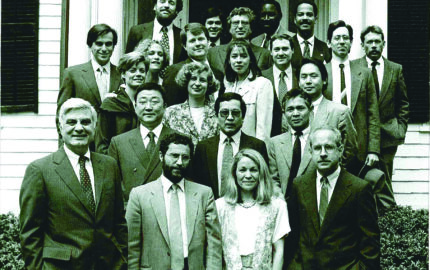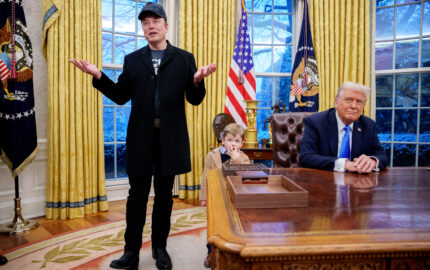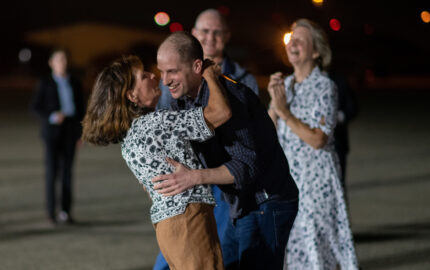On my first morning in Lippmann House, I was given a thick green folder with lots of information to be quickly absorbed. Inside was a memo from Bill Kovach addressed “To My Successor.”
“You poor man,” I thought. “You gave 10 years of your life to creatively enlarging and improving the Nieman program and on the day you retired you did not know the identity of your successor.”
Bill’s memo began, “Congratulations. You’ve just begun one of the greatest jobs in the world of journalism. As you know you’ve also inherited an important mandate—‘to promote and elevate the standards of journalism’—at a crucial time in the history of journalism.”
As I read Bill’s note I wondered how many different versions of passing the mantel had been played out in the transition from one Curator to the next. Bill served as acting Curator during the last months of Howard Simons’ life and then was named his successor in June 1989.
In a warm remembrance published in the Summer 1989 issue of Nieman Reports, Bill wrote, “There is a special sense of loss here at the Lippmann House. An enormous energy is missing…. Howard found a way to preserve the unique character of the program while at the same time infusing it with a new vitality and sense of mission.”
Bill is missed in much the same way, not only at Lippmann House but throughout the university. He has built on the legacy of Howard Simons, engaging the prestige of the Nieman Foundation to speak forcefully and authoritatively for journalism.
At the Nieman reunion last April, Harvard’s President, Neil Rudenstine, spoke tellingly of Bill’s work. “No one represents the ideals of the Nieman Foundation more powerfully than Bill Kovach…. He has consistently pointed out the dangers of recent mergers between entertainment and media organizations. As Chair of the Committee of Concerned Journalists, he has begun and sustained a national dialogue dedicated to strengthening the core values of a responsible free press…. The Nieman Foundation, under Bill, has become a kind of conscience for the press.”
Bill also built on the vision of Jim Thomson and Howard Simons in enlarging the participation of international Nieman Fellows, who now comprise half of each Nieman class. The international fellows bring a global dimension to the Nieman experience and to the Harvard community. In many cases, they are journalists who have struggled to practice their craft under repressive regimes in countries where a free press is a fragile, emerging concept.
The state of journalism will forever be the unfinished business of the Nieman Foundation. The opportunity to participate in the discussion through the pages of this magazine, through conferences and seminars, through partnerships with other Harvard institutions and leading organizations in the journalistic community, through the contributions of the fellows, through a global outreach and through the network of former Nieman Fellows is at once challenging, exciting and humbling.
To a considerable extent, the Nieman Foundation’s ability to help raise the standards of journalism has been enhanced by the reach and potential of its Web site as an invaluable place to engage the Nieman family and the larger world of journalism in a continuing discussion about the state of journalism.
The mission to promote and elevate the standards of journalism is a purpose the Nieman Foundation shares with the larger journalistic community. We are but one of many leading journalism organizations and foundations that are striving to understand deeply held public concerns about journalistic practices. The public is troubled by the blending of entertainment and news and by what it observes when television enables viewers to watch reporters at work. When asked, members of the public willingly provide examples of reportorial arrogance and insensitivity and a failure to fully grasp the details as well as the nuances of stories. That this distrust of the press and its practices is a matter of significant concern has been amply documented in a myriad of ways—through surveys, conferences, studies, focus groups, conversations with readers and viewers.
In my recent work with The Freedom Forum, with its particular focus on fairness, I have developed a deep respect for the public’s sophisticated understanding of how the behavior of individual journalists influences their perceptions of fairness in the news media. The public’s definitions of what is fair and what is not fair are broader and deeper than those voiced by many journalists. When asked about fairness, journalists tend to talk about accuracy, balance and lack of bias. Readers and viewers mention racial and cultural insensitivity, over-dependence on unnamed sources, reluctance to correct errors, and words reporters use to characterize individuals in stories.
As I have listened to reporters talk about fairness, and as I have participated with the American Society of Newspaper Editors and the Associated Press Managing Editors in a number of projects focusing on the performance of the press, I am reminded of the enduring commitment of journalists to do better, even though actual improvements don’t always live up to this expression of commitment.
To each of those journalists and friends who has written to me in recent weeks, I have offered this wish: As I pursue the obligation to continue the direction Bill Kovach and his predecessors have established, I invite you to engage in our work through your thoughts and ideas about ways the Nieman Foundation might even more effectively advance the special purpose we share.
This is an invitation to all of our readers, as well.
“You poor man,” I thought. “You gave 10 years of your life to creatively enlarging and improving the Nieman program and on the day you retired you did not know the identity of your successor.”
Bill’s memo began, “Congratulations. You’ve just begun one of the greatest jobs in the world of journalism. As you know you’ve also inherited an important mandate—‘to promote and elevate the standards of journalism’—at a crucial time in the history of journalism.”
As I read Bill’s note I wondered how many different versions of passing the mantel had been played out in the transition from one Curator to the next. Bill served as acting Curator during the last months of Howard Simons’ life and then was named his successor in June 1989.
In a warm remembrance published in the Summer 1989 issue of Nieman Reports, Bill wrote, “There is a special sense of loss here at the Lippmann House. An enormous energy is missing…. Howard found a way to preserve the unique character of the program while at the same time infusing it with a new vitality and sense of mission.”
Bill is missed in much the same way, not only at Lippmann House but throughout the university. He has built on the legacy of Howard Simons, engaging the prestige of the Nieman Foundation to speak forcefully and authoritatively for journalism.
At the Nieman reunion last April, Harvard’s President, Neil Rudenstine, spoke tellingly of Bill’s work. “No one represents the ideals of the Nieman Foundation more powerfully than Bill Kovach…. He has consistently pointed out the dangers of recent mergers between entertainment and media organizations. As Chair of the Committee of Concerned Journalists, he has begun and sustained a national dialogue dedicated to strengthening the core values of a responsible free press…. The Nieman Foundation, under Bill, has become a kind of conscience for the press.”
Bill also built on the vision of Jim Thomson and Howard Simons in enlarging the participation of international Nieman Fellows, who now comprise half of each Nieman class. The international fellows bring a global dimension to the Nieman experience and to the Harvard community. In many cases, they are journalists who have struggled to practice their craft under repressive regimes in countries where a free press is a fragile, emerging concept.
The state of journalism will forever be the unfinished business of the Nieman Foundation. The opportunity to participate in the discussion through the pages of this magazine, through conferences and seminars, through partnerships with other Harvard institutions and leading organizations in the journalistic community, through the contributions of the fellows, through a global outreach and through the network of former Nieman Fellows is at once challenging, exciting and humbling.
To a considerable extent, the Nieman Foundation’s ability to help raise the standards of journalism has been enhanced by the reach and potential of its Web site as an invaluable place to engage the Nieman family and the larger world of journalism in a continuing discussion about the state of journalism.
The mission to promote and elevate the standards of journalism is a purpose the Nieman Foundation shares with the larger journalistic community. We are but one of many leading journalism organizations and foundations that are striving to understand deeply held public concerns about journalistic practices. The public is troubled by the blending of entertainment and news and by what it observes when television enables viewers to watch reporters at work. When asked, members of the public willingly provide examples of reportorial arrogance and insensitivity and a failure to fully grasp the details as well as the nuances of stories. That this distrust of the press and its practices is a matter of significant concern has been amply documented in a myriad of ways—through surveys, conferences, studies, focus groups, conversations with readers and viewers.
In my recent work with The Freedom Forum, with its particular focus on fairness, I have developed a deep respect for the public’s sophisticated understanding of how the behavior of individual journalists influences their perceptions of fairness in the news media. The public’s definitions of what is fair and what is not fair are broader and deeper than those voiced by many journalists. When asked about fairness, journalists tend to talk about accuracy, balance and lack of bias. Readers and viewers mention racial and cultural insensitivity, over-dependence on unnamed sources, reluctance to correct errors, and words reporters use to characterize individuals in stories.
As I have listened to reporters talk about fairness, and as I have participated with the American Society of Newspaper Editors and the Associated Press Managing Editors in a number of projects focusing on the performance of the press, I am reminded of the enduring commitment of journalists to do better, even though actual improvements don’t always live up to this expression of commitment.
To each of those journalists and friends who has written to me in recent weeks, I have offered this wish: As I pursue the obligation to continue the direction Bill Kovach and his predecessors have established, I invite you to engage in our work through your thoughts and ideas about ways the Nieman Foundation might even more effectively advance the special purpose we share.
This is an invitation to all of our readers, as well.



